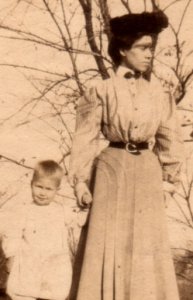Warrigal
SF VIP
- Location
- Sydney, Australia
Being a grandmother myself, I naturally see the truth of this hypothesis.
My mum was invaluable to me as I raised my little ones.
I've carried on the tradition with my grandchildren, equally helping my daughter and daughter in law to raise their children.
It isn't always the case. My mother's mother died before I was born and my other grandmother, though close geographically, as in just across the street, did not play any significant part in our lives. Mum was supported by her sisters, one of whom was a spinster. The role of aunties should not be overlooked either.
The Grandmother Hypothesis
By Penny Johnston (Penny is the presenter of Babytalk)
Could you possibly imagine that the rise of Human Beings as a dominant species could be laid at the feet of our grandmothers? The Grandmother Hypothesis is an anthropological theory suggesting that civilisation, family bonding, communication, long life and the development of empathy might all be due to the role of older, non childbearing women in the earliest groups of human beings! It's a fascinating idea and came about by observing the behaviour of tribal grandmothers interacting with their grandchildren while searching for food in Africa.
The Grandmother Hypothesis began to evolve when anthropologists, ethnographers and zoologists studying the family groupings of the chimpanzees and other apes started to wonder why females lost their fertility long before their lifespan ended. What role did these older infertile females play in the family group? What tasks did they take on to ensure the survival of the larger clan? Did they contribute to the rise in population of homo sapiens as a species and was their role in the survival of younger children so valuable that family grouping and civilization was the end result?
Distinguished Professor Kristen Hawkes from the University of Utah began her research as an ethnographer looking at the Hadza hunter-gatherers in Africa. She noticed that the older women in the society spent their days collecting food for their grandchildren. That was the light bulb that sparked Professor Hawkes' interest in the 'Grandmother Hypothesis', which says that humans evolved to live so long because grandmothers were around to help take care of the toddlers and small children allowing their daughters to have more children and more quickly.
The Grandmother Hypothesis goes further than to establish the importance of grandmothers. In our early years as a species, the theory goes, older women helped gather food for their offsprings' offspring. In so doing, they were freeing up their daughters to have more children, more quickly. So the most evolutionary fit grandmothers have the most grandchildren, to whom they pass on their longevity-promoting genes.
Modern families continue to benefit from the incredibly valuable input of Grandmothers into childrens lives, so if you know a grandmother that's contributing to the function of their family you'll have to make sure you tell them that their role was pre-destined before civilization began... and make sure you remember we wouldn't be anywhere without her!
My mum was invaluable to me as I raised my little ones.
I've carried on the tradition with my grandchildren, equally helping my daughter and daughter in law to raise their children.
It isn't always the case. My mother's mother died before I was born and my other grandmother, though close geographically, as in just across the street, did not play any significant part in our lives. Mum was supported by her sisters, one of whom was a spinster. The role of aunties should not be overlooked either.


